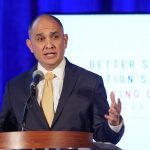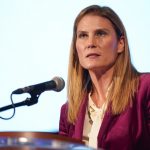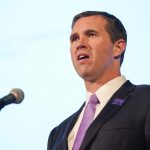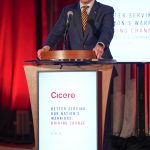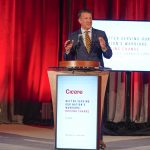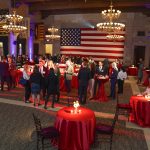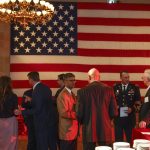Secretary Bob McDonald’s Cicero Serves Remarks
The following is a transcript of remarks made by Fmr. V.A. Sec. Bob McDonald at “Better Serving Our Nation’s Warriors: Driving Change” in Washington D.C. on December 5, 2019.
I’d like to call out former secretary of the VA, Jim Peake, my friend, my predecessor. All of us who enter these roles in government stand on the shoulders of the giants who came before us and Jim certainly is one of those giants.
I’d like to congratulate Miguel on the opening of the Cicero office in D.C. Miguel did tremendous work at the Bush Institute, I know that we’ll miss him, but we’re look forward to the great things he will do here.
For me it’s great to be back here in this Hall of Flags. I was here many times as the chairman and CEO of the Procter & Gamble Company. This is a really, really special place. What’s really special to me about it is its proximity to a number of things. One of those is St. John’s Episcopal Church. I don’t know how many of you have had the opportunity to go to St. John’s, but it’s the church I attended when I lived just down the block. In the back of the church on the righthand side of that church is what’s called the Lincoln Pew. Now, surprisingly, the Lincoln Pew is not that large, and I wonder how President Lincoln could fit in that pew, but as the story goes: during the Civil War as people were dying every single day, 750,000 American lost their lives in The Civil War. 750,000. Do the math, in four years that’s 513 Americans dying each day, every day, for four years, and that weighed on the president.
He would come over across Lafayette Park on Sunday night and sit in that pew in the back of the church, he didn’t want to disturb anyone, and he would pray for the Union. You could just see how viscerally he felt the loss that was occurring in the country. Then of course, if you go further down the road, you go to the Lincoln Memorial, and you walk up the steps you’ll notice that there are two speeches on the walls. On the left-hand side of the wall is the Gettysburg Address, arguably one of the greatest speeches ever given. On the righthand side of the wall is the second inaugural address. And for all of us involved in veteran’s activities, we know that the second inaugural address is the inspiration for what all of us do, it’s the inspiration for The Department of Veteran’s Affairs. “To care for him who shall have borne the battle, and for his widow, and his orphan.”
Now with 11% to 12% of veterans being women we say “To care for those who have borne the battle and their families.” It is incredibly important, it’s the most inspiring mission in government and it’s such a necessary mission for all of us to help with.
So, how are we doing? Well, since the crisis of 2014, I would argue we’re doing better and a lot of people deserve credit for this, a lot of the people in this room. We have a vision to be the best customer service organization in the federal government, we’re making progress. We added more doctors, we’ve added more nurses, we’ve added more clinical space, we’ve added more access. To the point that by the end of 2016 we had same-day access to primary care and mental health care in the major facilities.
We created a veteran experience office, we created an office of strategic partnerships led by, during my time, Matt Collier who is here tonight. We also train the organization leadership. We train the organization in being “human-centered” so we can journey map the veteran experience from the day we raise our hands and join, to the day we are buried in a VA cemetery.
We tried to work on changing the culture from being rules-based to being principles-based and because of that principles-based nature, we can better help our veterans. There’s not a great customer service organization in the world that is rules-based, they’re all principles-based which allows employees to take initiative. Through all of this we’ve identified the moments that matter. We measure them, and we’ve re-engineered our work processes to try to delight veterans – and that’s not just me, that’s also Secretary Shulkin and Secretary Wilkie who have all followed.
Trust is up at the VA. Trust of the VA is up from 55% when we first measured it in 2016 to 73% this year. Progress. But we’re not done yet, and this is where you all come in. We’re not done yet. Demand continues to rise, and this is my experience in business. The better you do at providing customer service, the more people who want part of that service, and those who want the service, want more of it. And so, demand continues to rise. Congress continues to provide more benefits. We’ve had an almost 50% increase in patients since the year 1999. 50%. Imagine a business that can absorb that kind of increase. We’ve had nearly 100 million outpatient visits every year. The budget is up over 90% during President Obama’s eight years and President Trump has raised it twice since then. Veterans are aging. When I graduated from West Point in 1975 there were two million veterans over the age of 65. Today there are 10 million veterans over the age of 65, an increase of five times, and as we all know, I can certainly prove it, the older we get the more medical problems we have.
Veterans are more likely to survive the battlefield today than ever before. For the first time ever, we have multiple veterans with no arms and no legs leading productive lives. Veterans are becoming more diverse. I talked about the increase in the number of women veterans. It’s necessary to provide unique treatment, unique care, for those veterans.
While we’re doing great and making great progress, the job is becoming more and more difficult. In my mind, this is why all of us are so important. The VA cannot do this job by itself. It needs the help of strategic partners. That’s why we set up the office and I know that’s why many of you in your organizations are involved. Now, there are really two things that you can do to help the VA: First is you can provide capacity, for example, the Given Hour initiative which Dr. Barbara Van Dahlen, who is here tonight, created, where mental health professionals would give an hour of their time to help the VA, is a great example. Another example is my first trip to visit Home Base in Boston where I discovered that Home Base could treat veterans who had dishonorable discharges, which is, which was, against the law for the VA to do that. And they could treat family members, which the VA couldn’t do at the time as well. So, you add capacity and that capacity is necessary for the entire military community.
The other critical thing to do is to add knowledge. I was surprised when I got to VA and discovered that human-centered design, which every great customer service company in the United States or around the world uses to improve this service delivery, was foreign to the VA. You can bring business best practices to government and that becomes an important part of the future. The VA needs strategic partners to fill in these gaps and I thank all for you’re doing to do that. Continue to do it, continue to help add capacity, continue to help bring best practices to government.
Legislation, by its very nature, is imperfect and early on I discovered that one of the imperfections of legislature was the lack of care for caregivers. Thanks to Senator Elizabeth Dole and the Elizabeth Dole Foundation, we’ve now got more programs for caregivers. Consider in-vitro fertilization. In the beginning of the VA, disabled veterans who lost their ability to have families couldn’t get treatment from the VA. That has been fixed. Continue to show us new and innovative ways we can improve legislation to care for the entire community.
Why is this important?
When I think back to my last time at Arlington National Cemetery for Veteran’s Day, it was 2016 and I introduced President Obama. I always come back to that last scene in the movie Saving Private Ryan. The aged Private Ryan kneels reverently in front of Captain Miller’s grave. An aged Private Ryan, turns to his family and says, “I hope, at least in your eyes, I’ve earned it.” I get choked up every time I think about this because it’s what I say to myself every day: “Tell me that I’ve earned it. I hope that in your eyes I have earned it.”
I know all of us, who care so deeply about the military community, ask that question every single day. And I think as long as we are here as a republic, a free republic, a beacon of hope and light for the rest of the world, we need to ask that question. Thank you.

Start a Conversation
Thank you for your interest in Cicero Group. Please select from the options below to get in touch with us.

